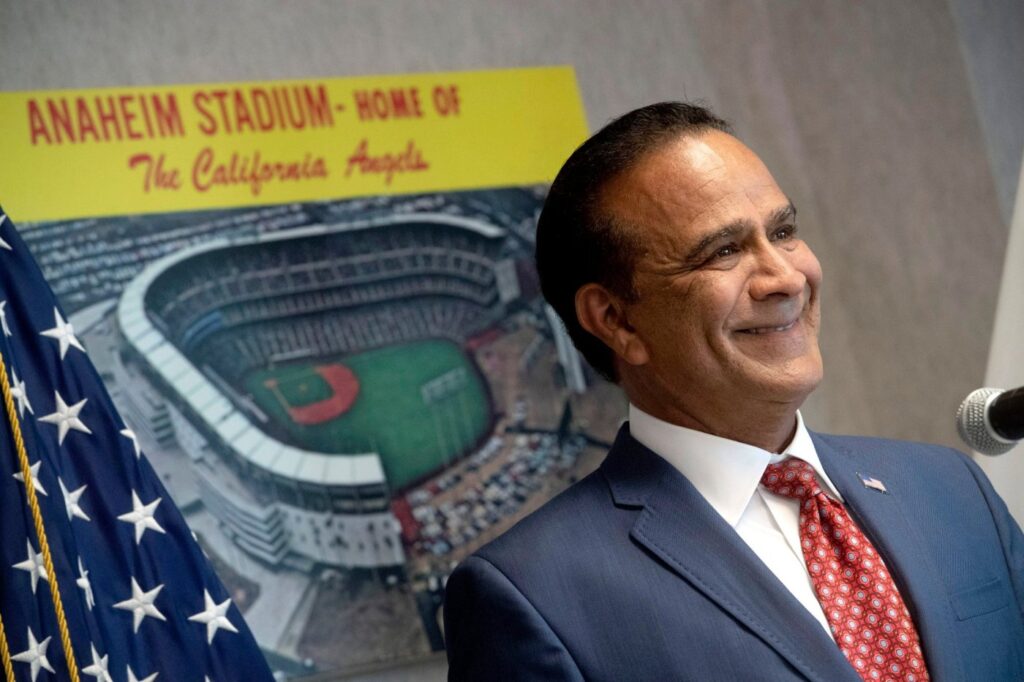
SACRAMENTO – Longtime Anaheim watchers, myself included, need to restrain from schadenfreude – the German word for “pleasure derived … from another person’s misfortune.” We’ve eagerly read the details of a federal probe that touches on a “cabal” of city insiders who, to paraphrase H.L. Mencken, showed as much public-spiritedness as your average streetwalker.
In reality, it’s a sad story that didn’t have to turn out this way. Anaheim could have followed its better angels and pursued the path blazed by its more civic-minded past leaders, who preferred freedom-friendly policies to crony capitalism.
The government hasn’t charged anyone with a crime, but Mayor Harry Sidhu resigned as Anaheim’s mayor last week, after an FBI affidavit alleges that he “shared privileged and confidential information with the Angels during stadium sale negotiations … and expects to receive campaign contributions as a result.” Sidhu denies any wrongdoing.
I almost wrote “Arizona resident Harry Sidhu” because the FBI also alleges that Sidhu — who presumably lives in Anaheim Hills – registered a helicopter he purchased at a Scottsdale address to avoid paying more than $15,000 in California taxes.
In a separate matter, a federal affidavit details an alleged plot in which former Anaheim Chamber of Commerce CEO Todd Ament and a political consultant “devised a scheme to launder proceeds intended for the Chamber through the PR firm into Ament’s bank account” to help him buy a mountain home, according to the U.S. Attorney’s Office. We should withhold judgment until it plays out.
But this is what caught my eye. The feds claim that Ament and that consultant were the ringleaders of a small insider group that “allegedly exert(ed) influence over government operations in Anaheim.” Anaheim’s political class is – please commence your eye rolling – shocked at the allegations. Sidhu’s council allies quickly threw him under the bus.
If reports of the cabal are accurate, then Sidhu wasn’t the big fish. He’s just the latest functionary to serve as something of a figurehead. Sidhu never seemed to have a well-pronounced political philosophy – but he clearly enjoyed the limelight as he bloviated about “empowering the American Dream” and promised great things for the city of Anaheim.
As Politico reported, the feds describe the cabal “moving elected officials like chess pieces, mocking one for bumbling a ‘script’ they wrote for him.” Such behavior is not illegal, but it’s what has caused so much local consternation. It’s long been clear that Anaheim operated in a secretive manner – for the apparent benefit of special interests rather than the public.
As home to two professional sports teams and Disneyland, Orange County’s largest city has offered political temptations beyond what its size would suggest. One need only watch Anaheim’s public meetings to realize– and I’m trying to be charitable – that its council is out of its league dealing with corporate interests that seek subsidies, influence and lopsided deals.
The recent letter from an Angels’ attorney demanding the city go through with the stadium sale by June 14 gives insight into the un-level playing field. Hadn’t the company been paying attention to the mayoral resignation, federal investigation and Attorney General Rob Bonta’s request that the court pause a related affordable-housing settlement? Obviously, the team saw what was happening yet insisted that the city close on the deal anyway, regardless of the civic ramifications. The company didn’t say “or else,” but we can read between the lines.
My concern isn’t so much the salacious federal allegations but the city’s modus operandi. Anaheim was about to sell its largest public asset – Angel Stadium and surrounding prime acreage – to a development group controlled by the team’s owner for less than its market value. It tried to do so in a secretive manner. It would have consummated the giveaway (after the courts and housing officials gave the OK), had the feds not intervened.
The council has provided hundreds of thousands of dollars in subsidies to the Chamber of Commerce to provide “services” city staff could have provided. Although the deal later went south, the city offered Disney a $267 million tax break to build a luxury hotel, epitomizing Anaheim’s crony capitalist governance approach.
In 2018, the city’s principled anti-subsidy Republican Mayor Tom Tait was termed out of office. As David Bahnsen wrote in National Review, that November’s mayor’s race pitted “a well-heeled, subsidy-loving cronyist Republican … against a Democrat and another Republican who lacks the financial resources to wage a big campaign.” You can guess the name of that well-heeled candidate and imagine the level of political spending that year.
In the early 2000s, then-Councilman Tait spearheaded that “freedom friendly” approach that rejected subsidies and favoritism. The city kept taxes low, made it easy for all businesses of any size to operate in the city and focused on the nuts-and-bolts of government. But Anaheim ultimately embraced the dark side. None of us should take any pleasure watching this ugly spectacle unfold.
Steven Greenhut is Western region director for the R Street Institute and a member of the Southern California News Group editorial board. Write to him at sgreenhut@rstreet.org.
